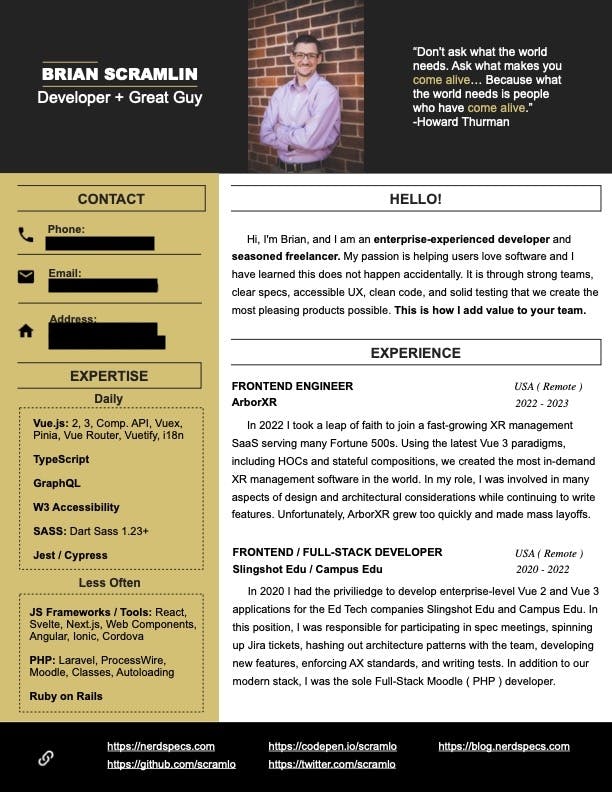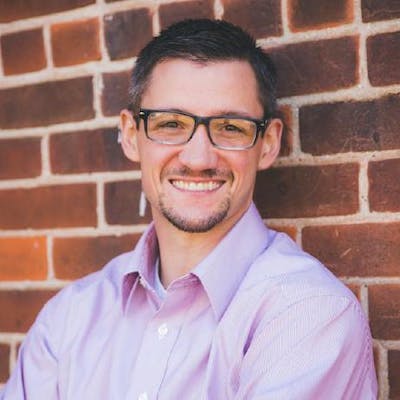
Photo by RetroSupply on Unsplash
Becoming a Full-Time Developer: Your Resume
How to Build Your Developer Resume
Introduction
It has been over one year since I published my featured article, Becoming a Full-Time Developer: Introduction. I desired to write this series over a few weeks, but life got away from me. I have two kiddos under nine, a house we are renovating, a master's degree I am finishing, and a full-time job after all!
However, I am compelled to write about this subject because I want to help others enter into this amazing career. I love being a developer! There are many things I learned along the way and I believe I can help some of you get to where I am at today. In this installment, I'll talk about my resume.

There is probably a lot out there about resumes. I did not go and read about resumes. However, I knew I wanted to stand out and communicate who I am and not just what I have done. I will also say that I must be pretty good at writing resumes because a college professor from another state once left me a voicemail that he found my resume online and used it as an example in his class!
So, here is the real-true-to-life resume I have used. I've even included an error I found where I accidentally copy-and-pasted the same date for my bachelor's and upcoming master's degree. Oops!
Take a look and then I will discuss some things.
Real Life Resume


Examining my Resume
Let's take a look at each element of my resume from the top down.
Header
Similar to a website, I have a header that is intended to grab the attention of the screener. Remember, if your resume gets stopped at any point, you do not get an interview. If you do not get an interview, you cannot get that job. Our goal with the resume is to get an interview! There are three important aspects of my header.
The image: You need to pay some money and get a real headshot from a real photographer. My wife did this for me as a gift one year and I had no idea how often I would use my headshots. I use them on X, Slack, (sounds like Ex-Lax lol), email signatures, and more.
The tagline: A tagline helps instantly frame you. I know this version says "Developer + Great Guy," but for some positions I said "Developer + Designer" or "Developer + Leader" depending on the position I was applying for. I felt for the position I was applying for I did not want to pigeonhole myself into a particular role, but wanted to communicate that I am humorous and personable.
The quote: A quote shows others that you read and what drives you. I recently heard an interview with Taylor Desseyn where he said something like "When we interview people and ask 'what are you passionate about?' and the answer is 'nothing in particular,' that is a red flag. I just want to know you can be passionate about something. Because maybe you can also be passionate about what we are doing here."
Intro
Your intro is the next most important thing. Here is your elevator pitch. Screeners want to know who you are, what you can do, and why they should pick you. So, you can see I did these three things pretty clearly and used bold text sparingly to emphasize what is important to remember about me.
Experience
Moving on, we get to your experience. What we want to see here is the meta (company, position, and years there) and then a story that communicates what you did, stack highlights, and how you added value to that company. Some people call for the Star Method, but I do not think there is room for that. Consider how I made the companies I have served look great (which makes me look great) and the way I highlighted parts of my experience that are valuable to the companies I am applying for. By the way, I think the stories should start longer the more recent they are and get shorter. Further, you can just blanket some things that are not that relevant. I was in full-time church ministry for eleven years, but that is not the most crucial to know for the roles I am applying for.
Education
Education is not that important. That is, nobody cares about your GPA or where you went to school. Also, choose the most important things, but you do not need to fill up your paper with every badge you have ever earned on CodePen or FreeCodeCamp.org. What are the big blocks in your educational foundation? Now, I do not know if this is different if you have not attended college, so you may need more advice here.
What You Can Expect
This is essentially my conclusion. This is where I really want to hook people and help them realize they are missing out if they do not interview me. I thought about what I am good at and what I want to be doing, then put them in bold.
My Story
This is an "extra." If you have the room, you can share a back story that will help the interviewers get to know who you are. The screeners may not read this, but the people at the next round of interviews probably will. In this space, I can talk about my skills outside of tech and where I am at in life right now. Anything you can do to create a conversation during an interview will keep you "top of mind" when team leaders and CTOs are doing tens of interviews a day.
Contact
Obvious...
Expertise
I break my expertise into two categories: Daily and Less Often. I do this because I want people to know I am not just loading up my resume with buzzwords. This differentiation allows me to be honest and highlight my strengths. Also, you will find that these lists get long quickly. What kind of companies and positions are you applying for? If you are getting a SaaS job, nobody cares about your WordPress experience. Show us you have the skills that we need.
Other Skills
I love this area. I am sure everyone has skills that are not directly relevant to the position at hand but may be useful in cross-team meetings, or at least as another hook to create conversations with interviewers. Almost every interview I have ever had has brought up Zelda with me.
Quick Facts
This is another opportunity to share who you are and create conversation hooks.
References
I do not know why, but I felt like having a good, symmetrical two professional and two personal references was just right. Find people that can vouch for you and I would guess the "higher up the ladder" they are, the better. Honestly, I have never had an interviewer talk to me about my references before. Maybe they are not even called very often!
Links
I struggle with the links. Can I be real with you? I have weak links (am I the weakest link?). My CodePen is filled with half-baked things from throughout the years, my GitHub is a mess of project ideas, my portfolio has not been updated in years, my blog has two or three posts on it, and nothing is interesting on my Twitter feed.
But, you know what? The links look good. Am I right? Who doesn't love the feeling of contact information at the bottom of a website, and who doesn't love a bunch of links at the bottom of a resume? So, I say, keep the links, be they weak or strong.
Additional Thoughts
Do not include things in your resume that you do not want to do. I read in the book 48 Days to the Work You Love that people are tempted to bulk up their resume with impressive things but that do not give them life. If you keep advertising yourself for things you do not want to do, then you will keep getting put in positions to do those things.
Change your resume to match the job you are applying for. Your lead statement can focus on things like design if you are applying for a hybrid Frontend-UI/UX position or on your versatility if applying for a full-stack role.
If a cover letter is asked for, I have taken the resume template and just included a custom paragraph that brought in elements from my resume. Most cover letters can be the same, but make sure to uniquely name the company you are applying for. However, do NOT forget to change it for each company!
What did I use to create my resume? I tried a few different programs but finally settled on Keynote. I think Keynote or PowerPoint are excellent programs because they allow you to put elements off the side of the document to swap in and out, but when you have the document the way you want it you can easily export it to various formats.
I recommend making folders for the companies you are applying for and then exporting your resume as a PDF with a filename like brian-scramlin-resume.pdf. The folders create namespaces for your resume so you can keep them from being something like brian-scramlin-resume-google.pdf. To me, that kind of filename shows you may be writing custom resumes depending on the company you are applying for. I understand that I told you to do that, but you do not need to be so obvious about it!
Jenna Pederson has eleven more great tips in her blog post here: https://jennapederson.hashnode.dev/11-tips-for-writing-a-resume-to-land-that-job.
How About You?
What tips and tricks have you learned regarding developer resumes? Are there any resources you would recommend to others?

